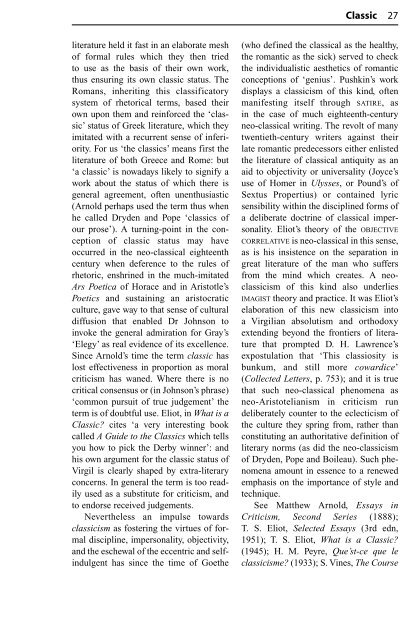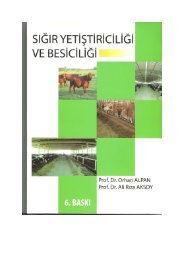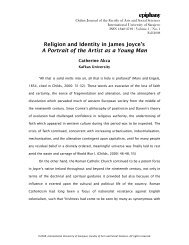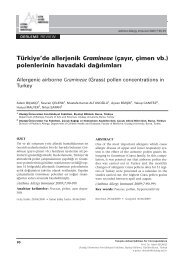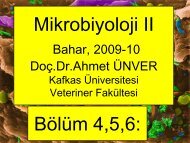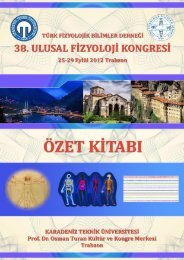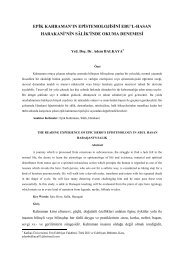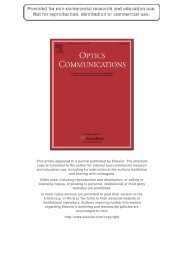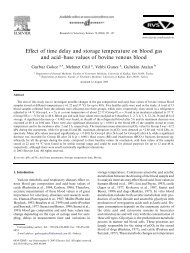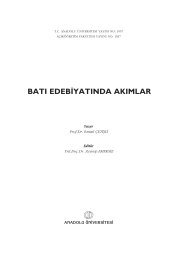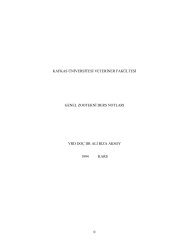The Routledge Dictionary of Literary Terms
The Routledge Dictionary of Literary Terms
The Routledge Dictionary of Literary Terms
Create successful ePaper yourself
Turn your PDF publications into a flip-book with our unique Google optimized e-Paper software.
literature held it fast in an elaborate mesh<br />
<strong>of</strong> formal rules which they then tried<br />
to use as the basis <strong>of</strong> their own work,<br />
thus ensuring its own classic status. <strong>The</strong><br />
Romans, inheriting this classificatory<br />
system <strong>of</strong> rhetorical terms, based their<br />
own upon them and reinforced the ‘classic’<br />
status <strong>of</strong> Greek literature, which they<br />
imitated with a recurrent sense <strong>of</strong> inferiority.<br />
For us ‘the classics’ means first the<br />
literature <strong>of</strong> both Greece and Rome: but<br />
‘a classic’ is nowadays likely to signify a<br />
work about the status <strong>of</strong> which there is<br />
general agreement, <strong>of</strong>ten unenthusiastic<br />
(Arnold perhaps used the term thus when<br />
he called Dryden and Pope ‘classics <strong>of</strong><br />
our prose’). A turning-point in the conception<br />
<strong>of</strong> classic status may have<br />
occurred in the neo-classical eighteenth<br />
century when deference to the rules <strong>of</strong><br />
rhetoric, enshrined in the much-imitated<br />
Ars Poetica <strong>of</strong> Horace and in Aristotle’s<br />
Poetics and sustaining an aristocratic<br />
culture, gave way to that sense <strong>of</strong> cultural<br />
diffusion that enabled Dr Johnson to<br />
invoke the general admiration for Gray’s<br />
‘Elegy’ as real evidence <strong>of</strong> its excellence.<br />
Since Arnold’s time the term classic has<br />
lost effectiveness in proportion as moral<br />
criticism has waned. Where there is no<br />
critical consensus or (in Johnson’s phrase)<br />
‘common pursuit <strong>of</strong> true judgement’ the<br />
term is <strong>of</strong> doubtful use. Eliot, in What is a<br />
Classic? cites ‘a very interesting book<br />
called A Guide to the Classics which tells<br />
you how to pick the Derby winner’: and<br />
his own argument for the classic status <strong>of</strong><br />
Virgil is clearly shaped by extra-literary<br />
concerns. In general the term is too readily<br />
used as a substitute for criticism, and<br />
to endorse received judgements.<br />
Nevertheless an impulse towards<br />
classicism as fostering the virtues <strong>of</strong> formal<br />
discipline, impersonality, objectivity,<br />
and the eschewal <strong>of</strong> the eccentric and selfindulgent<br />
has since the time <strong>of</strong> Goethe<br />
Classic 27<br />
(who defined the classical as the healthy,<br />
the romantic as the sick) served to check<br />
the individualistic aesthetics <strong>of</strong> romantic<br />
conceptions <strong>of</strong> ‘genius’. Pushkin’s work<br />
displays a classicism <strong>of</strong> this kind, <strong>of</strong>ten<br />
manifesting itself through SATIRE, as<br />
in the case <strong>of</strong> much eighteenth-century<br />
neo-classical writing. <strong>The</strong> revolt <strong>of</strong> many<br />
twentieth-century writers against their<br />
late romantic predecessors either enlisted<br />
the literature <strong>of</strong> classical antiquity as an<br />
aid to objectivity or universality (Joyce’s<br />
use <strong>of</strong> Homer in Ulysses, or Pound’s <strong>of</strong><br />
Sextus Propertius) or contained lyric<br />
sensibility within the disciplined forms <strong>of</strong><br />
a deliberate doctrine <strong>of</strong> classical impersonality.<br />
Eliot’s theory <strong>of</strong> the OBJECTIVE<br />
CORRELATIVE is neo-classical in this sense,<br />
as is his insistence on the separation in<br />
great literature <strong>of</strong> the man who suffers<br />
from the mind which creates. A neoclassicism<br />
<strong>of</strong> this kind also underlies<br />
IMAGIST theory and practice. It was Eliot’s<br />
elaboration <strong>of</strong> this new classicism into<br />
a Virgilian absolutism and orthodoxy<br />
extending beyond the frontiers <strong>of</strong> literature<br />
that prompted D. H. Lawrence’s<br />
expostulation that ‘This classiosity is<br />
bunkum, and still more cowardice’<br />
(Collected Letters, p. 753); and it is true<br />
that such neo-classical phenomena as<br />
neo-Aristotelianism in criticism run<br />
deliberately counter to the eclecticism <strong>of</strong><br />
the culture they spring from, rather than<br />
constituting an authoritative definition <strong>of</strong><br />
literary norms (as did the neo-classicism<br />
<strong>of</strong> Dryden, Pope and Boileau). Such phenomena<br />
amount in essence to a renewed<br />
emphasis on the importance <strong>of</strong> style and<br />
technique.<br />
See Matthew Arnold, Essays in<br />
Criticism, Second Series (1888);<br />
T. S. Eliot, Selected Essays (3rd edn,<br />
1951); T. S. Eliot, What is a Classic?<br />
(1945); H. M. Peyre, Que’st-ce que le<br />
classicisme? (1933); S. Vines, <strong>The</strong> Course


